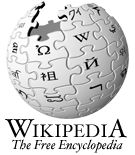Subject Index Title Word Index
2007 Wikipedia Selection for schools

 Welcome to this Wikipedia Selection. This 2007 Wikipedia DVD Selection is a free, hand-checked, non-commercial selection from Wikipedia, targeted around the UK National Curriculum and useful for much of the English speaking world. It is about the size of a fifteen volume encyclopaedia (24,000 images and 14 million words), and includes essentially all topics in Wikipedia rated "Good" or higher by Wikipedia itself at date of production. Volunteers at Wikipedia have also suggested more than a thousand other articles considered valuable and relevant to this project which SOS Children volunteers have checked and tidied up.
Welcome to this Wikipedia Selection. This 2007 Wikipedia DVD Selection is a free, hand-checked, non-commercial selection from Wikipedia, targeted around the UK National Curriculum and useful for much of the English speaking world. It is about the size of a fifteen volume encyclopaedia (24,000 images and 14 million words), and includes essentially all topics in Wikipedia rated "Good" or higher by Wikipedia itself at date of production. Volunteers at Wikipedia have also suggested more than a thousand other articles considered valuable and relevant to this project which SOS Children volunteers have checked and tidied up.
Wikipedia is the free encyclopaedia anyone can edit, and an independent study published by Nature found it very accurate, but Wikipedia is not a childsafe environment (you can meet anonymous adults there), has "adult" content, and suffers from graffiti and vandalism, which limits usefulness. This selection of topics have been carefully chosen, tidied up, and checked for vandalism and suitability (by SOS Children volunteers, whom we gratefully acknowledge). Around fifty items of graffiti were found and removed from this selection of articles. We also gratefully acknowledge the Wikimedia Foundation for their support and their agreement to our use of the Wikipedia logo, and tens of thousands of contributors to Wikipedia who have written and researched the content in the first place.
Topics were chosen for interest to children, by relevance to the National Curriculum and including much of the very best of Wikipedia. The selection is vast, and covers core subjects but does not try to be uniformly detailed: for example it has more depth on Llandudno, which is featured in the curriculum, than other similar places.
 The content can be navigated using a pictorial subject index, or a title word index of all topics. The subject index is to help you find relevant articles, not define them, so it deliberately includes topics which people may search for under the subject (for example, we know Pluto is no longer officially a planet but include it in the planets anyway because people may look for it there.
Equally countries are put in both Asia and Europe if we think people may look for them in either.) The title word index includes alternate article titles (so the article on Pyrite turns up under Fool's Gold etc.) including mispellings.
The content can be navigated using a pictorial subject index, or a title word index of all topics. The subject index is to help you find relevant articles, not define them, so it deliberately includes topics which people may search for under the subject (for example, we know Pluto is no longer officially a planet but include it in the planets anyway because people may look for it there.
Equally countries are put in both Asia and Europe if we think people may look for them in either.) The title word index includes alternate article titles (so the article on Pyrite turns up under Fool's Gold etc.) including mispellings.
The content comes in two forms: with just thumbnail images for free download from the SOS Children website or as a 3.5GB free DVD with larger image pictures. Both forms include a shortened copy of the SOS Children website with details of projects in 123 countries. This selection is also browsable online at http://schools-wikipedia.org/ . The content is covered by various disclaimers and licences.
You can use the indexes to find your way around but the best way is perhaps to pick an article and follow the links to other topics embedded in the text: for example, good starting places are Africa, The Solar System, Tsunami or Apple.
This selection is a part of a larger collection at Wikipedia, which we commend especially for older children. We have tried to tidy up all links to material not included (such as images where we perceived a copyright problem) but occasional "dead-ends" may remain, particularly in "part of a series" content boxes. Please let us know of any other faults, at the present time apart from a deliberate "Easter Egg", all known faults have been fixed. If you find pieces of foreign text appear as "?????" or similar, however, this is likely to be because you don't have an font installed for that language: please check the same article on Wikipedia itself before you complain. Also early versions of Internet Explorer give big gaps on some pages: again, check with a top tier free browser like Firefox before letting us know.
Please note that Wikipedia's policies are that content has to be verifiable and based on recognised reliable sources. We have not included references and sources in this selection, but you can check them at Wikipedia online if you have any questions.